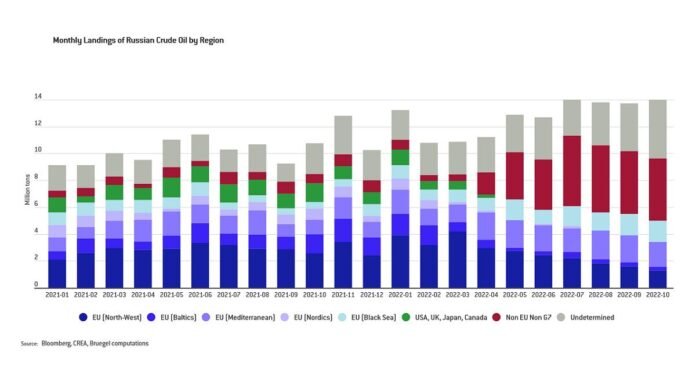Russian oil price peak
This UK decision follows a pledge made by G7 finance ministers last September to cap the price of Russian oil.
This price cap is “a way of undermining Putin’s ability to finance his war in Ukraine (…) while ensuring that third countries can continue to get oil at an affordable price”, the Treasury explained in a statement from the British. government.
On the other hand, neither Great Britain nor its G7 partners and Australia will benefit from the ceiling, London assures, because the latter has “banned the import of Russian oil” anyway.
Different services targeted
The services covered by the ban include in particular “insurance, brokerage and sea transport”. The level of the cap will be “set by the coalition in due course”, the UK government said.
London has also indicated that other restrictions, this time on the sale of Russian refined oil products, will come into effect on February 5 “to align with the EU’s timetable for a similar measure”.
The UK leaders in oil cargo insurance
The measure allows the UK to adjust to European decisions, an “adjustment” all the more important as British companies are leaders in a type of insurance that is vital to the maritime transport of oil.
Commercial boats must be covered by different types of insurance: for damage to the boat, for the cargo, but also unlimited coverage for damage to third parties, protection and indemnity (P&I) insurance.
Covering risks ranging from wars to environmental damage, this particular marine insurance is mainly provided by associations of professionals called “P&I Clubs” who pool the risks because it covers colossal sums.
London’s position in this area was particularly scrutinized by players in the sector, with the UK representing 60% of the P&I insurance market.
Our opinion, by leblogauto.com
In April last year, an article in the Financial Times called Boris Johnson, then British prime minister, visiting Kiev to show his solidarity with Volodymyr Zelensky, the Ukrainian president, as “conspicuous and outrageous”.
Adding that if Johnson wanted to support Ukraine against Russia’s invasion, he would have to pay a symbolic visit to a closer destination: the headquarters of Lloyd’s, the world’s largest insurance market, in the City of London… .
Until that date, the insurance industry had attracted little public attention compared to banks in terms of Western sanctions against Russia. No wonder: most politicians (and voters) have little knowledge of the sector’s complex but crucial role in finance and trade, the media added.
If the British government, along with its European and American counterparts, demanded that insurers stop protecting tankers carrying Russian oil, it would be another powerful weapon in Western efforts to pressure Moscow, the FT said.
He noted that tankers carry about three-quarters of all Russian oil exports, and one way for the West to reduce the flow of tankers would be to ban EU ships from “touching” Russian crude, he added.
According to him, another more effective tactic that would affect non-European ships would be that the British government prevents Lloyds Marine and Aviation unions from insuring the fleets that carry Russian oil; and for the UK, EU and US to ban the provision of property and casualty insurance. This would not stop all traffic, but most nation states would not deal with uninsured fleets and it would be difficult for transport groups to quickly find alternative cover.
95% of the world’s fleet use P&I insurance – protection and indemnity insurance, a form of mutual marine insurance provided by associations of professionals, called P&I clubs and London provides 80% of war cover, Neil Roberts, head of navy and air force at Lloyds Markets Association, told UK politicians last April.
For that reason, it is time for Western leaders like Boris Johnson to take a hard look at these insurance weapons – even if the Lloyds and P&I contracts are not as telegenic as a walkabout with Zelensky in Kiev, the Financial Times concluded.
Sources: AFP, Financial Times, Maritime-executive.com
